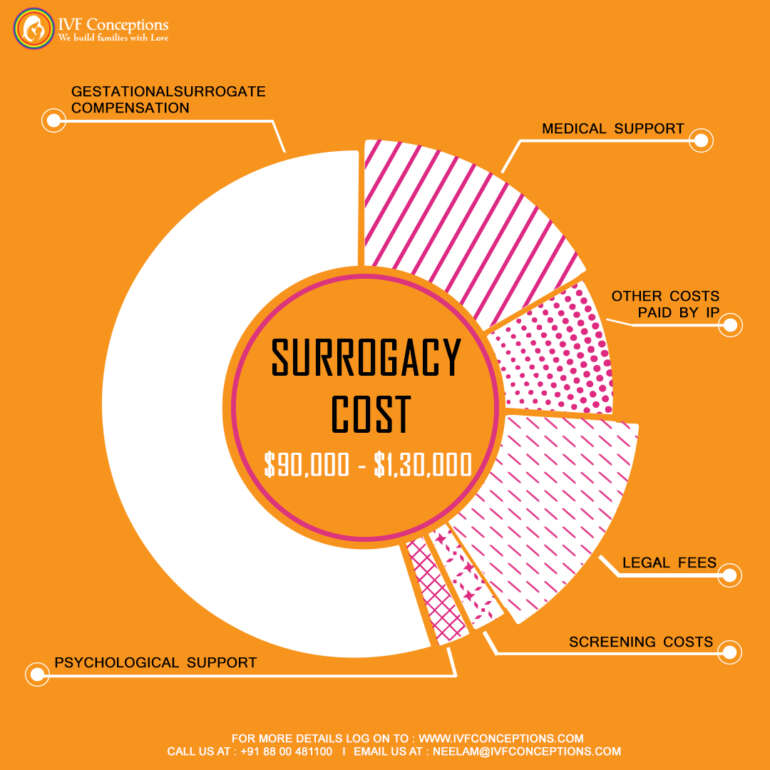Can Surrogacy for NRIs Is Allowed in India: A Comprehensive Guide
Yes, as per the current legal framework and the Latest Surrogacy Regulation Bill, altruistic surrogacy is allowed for NRI in India, if they meet all the other criteria put in the Surrogacy Act. For Non-Resident Indian (NRI) couples facing infertility challenges, surrogacy in India offers a ray of hope in their journey towards parenthood. However, understanding the legal framework and the surrogacy process is crucial to ensure a smooth and legally compliant experience. This comprehensive guide aims to provide you with detailed insights into the surrogacy laws, eligibility criteria, costs, and the step-by-step process in India.
- Book an online appointment: Get a free online consultation.
- Call\W:+91-8800481100 Email:neelam@ivfconceptions.com
Additional Guides for Surrogacy in Georgia
What are the Starting Steps for Surrogacy Process in Georgia?
How Much Does Surrogacy Cost in Georgia Country
Surrogacy for Hetero Couples in Georgia Europe
What are the latest Surrogacy Laws in India:
Only altruistic surrogacy is allowed in India as per the latest surrogacy laws in India.
India’s surrogacy landscape has undergone significant changes over the years. To address concerns related to unethical practices and exploitation, the Indian government introduced the Assisted Reproductive Technology (Regulation) Bill in 2021. This legislation outlines the current guidelines for surrogacy in India, defining assisted reproductive technology (ART) and recognizing children born through ART as the biological children of the commissioning couple.
Eligibility Criteria for Altruistic Surrogacy in India for Indian Citizens/NRI/ OCI:
The 2021 amendment brought about changes in surrogacy laws, broadening the eligibility criteria for NRI and Indian married couples. To initiate the surrogacy process, the following criteria must be met:
- Obtain a ‘certificate of essentiality’ and a ‘certificate of eligibility’ issued by the Government of India.
- The couple must have been married for a minimum of five years and either have no surviving biological or adopted children or have a child with a physical or mental disability, including those afflicted by fatal illnesses without a cure.
- The intended mother’s age should be between 23-50 years, and the intended father’s age should be between 26-55 years.
- Required documents include a certificate from a district medical board confirming proven infertility, insurance coverage for the surrogate mother for 36 months, and proof of marital status and citizenship.
How Much Does Cost of Surrogacy in India in 2024?
The cost of surrogacy in India typically ranges from 20 Lacs INR to 25 Lacs INR, which is notably lower than surrogacy costs in many other countries. The surrogacy cost can vary depending on the medical services, legal services, administrative services, and logistic support required by the intended parents.
Here are the typical itemized costs for surrogacy in India in 2024:
Medical Costs or IVF cost in India:
- IVF Treatment: ₹2,50,000 – ₹4,00,000
- Embryo Transfer: ₹75,000 – ₹1,00,000
- Antenatal Care: ₹1,50,000 – ₹2,00,000
- Delivery Charges: ₹1,00,000 – ₹1,50,000
Surrogate Mother’s Compensation in India:
- Insurance Premium for 36 months: ₹50,000 – ₹75,000
- Compensation to Surrogate: ₹4,00,000 – ₹5,00,000
Legal Costs or Legal Compliances and Approval:
- Documentation: ₹1,00,000 – ₹1,50,000
- Court & Attorney Fees: ₹1,50,000 – ₹2,00,000
Other Miscellaneous Costs:
- Surrogate’s Travel & Accommodation: ₹75,000 – ₹1,00,000
- Intended Parents’ Travel & Stay: ₹1,00,000 – ₹1,50,000
- Agency Fees: ₹3,00,000 – ₹4,00,000
The total estimated cost can range from approximately ₹20 Lakhs to ₹25 Lakhs.

It’s important to note that these are approximate figures, and the actual cost may vary based on the specific requirements, location of the clinic, and other factors. Additionally, it’s advisable to consult with a reputable surrogacy agency or clinic for a more accurate estimate based on your circumstances.
Sure, here’s the cost breakdown in a table format:
| Cost Component | Estimated Cost Range |
|---|---|
| Medical Costs | |
| IVF Treatment | ₹2,50,000 – ₹4,00,000 |
| Embryo Transfer | ₹75,000 – ₹1,00,000 |
| Antenatal Care | ₹1,50,000 – ₹2,00,000 |
| Delivery Charges | ₹1,00,000 – ₹1,50,000 |
| Surrogate Mother’s Compensation | |
| Insurance Premium for 36 months | ₹50,000 – ₹75,000 |
| Compensation to Surrogate | ₹4,00,000 – ₹5,00,000 |
| Legal Costs | |
| Documentation | ₹1,00,000 – ₹1,50,000 |
| Court & Attorney Fees | ₹1,50,000 – ₹2,00,000 |
| Other Costs | |
| Surrogate’s Travel & Accommodation | ₹75,000 – ₹1,00,000 |
| Intended Parents’ Travel & Stay | ₹1,00,000 – ₹1,50,000 |
| Agency Fees | ₹3,00,000 – ₹4,00,000 |
| Total Estimated Cost | ₹20 Lakhs – ₹25 Lakhs |
More Resources to Read:
Guaranteed Surrogacy in Georgia
How Does Gestational Surrogacy Work in Georgia? Step-by-step Guidance
Surrogate Mother Cost in Georgia
Why Choose Our Complete Surrogacy Consulting Services?
As a trusted surrogacy consultant since 2010, we take pride in our experience, expertise, and commitment to ethical practices. Our unique approach includes:
Option of choosing multiple surrogacy destinations with 14+ Years of international surrogacy experience.
- Getting a chance to work with fertility clinics/agencies that are elite and have a proven track record with references from existing IPs.
- Option of choosing multiple egg donor options- Asian, Caucasian, African, Oriental etc.
- All transparent financial transactions with affordability. You make direct payment with no additional fee on top.
- No hidden agent fee or surprise cost later on. All fees paid directly as per the agreement signed with service provider.
- Dedicated case manager to each IPs.
- Honest, transparent and quick communications.
- Assistance in all legal matters pertaining to visa and taking baby home process.
- Local support with access to all medical reports of egg donors and surrogate mothers.
- Assistance in all logistics of frozen sperms/embryos shipments.
- Last but not least, we have years of experience in coordinating delicate surrogacy programs with great personal care.
How Doest Surrogacy Process works in India:
The surrogacy process in India involves several crucial steps, including:
- Intended Parents’ Eligibility Assessment
- Surrogacy Legal Documentation
- Obtaining NOC (No Objection Certificate) and Court Order
- Surrogate Verification
- IVF Process and Embryo Transfer
- Ante-natal Care and Pregnancy Monitoring
- Coordinating Delivery
- Closure of Surrogacy
Conclusion:
Surrogacy for NRIs in India is possible, provided the intended parents fulfill the eligibility criteria set by the latest surrogacy laws. As a leading surrogacy consulting service, we are committed to guiding you through this journey, ensuring a transparent, ethical, and legally compliant process.
If you are ineligible for surrogacy in India, we can offer alternative international surrogacy options as well. Schedule a consultation call with us to discuss your options and receive further assistance tailored to your needs.
To confirm all this, can you give below detail to see if we can assist you with surrogacy in India legally?
- Female Partner Age:
- Male Partners Age:
- Citizenship:
- Marital status:
- Any child?:
- Medical reason for surrogacy:
- Self or donor cycle:
- Present location:
If you’d like to learn more about IVF, Egg Donation, or surrogacy services globally, check out the rest of our website at Complete Surrogacy. We offer legally secure and affordable surrogacy consulting services for FREE.
Our team has over 14 years of experience facilitating surrogacy arrangements, egg donation, and serving as an advocacy resource for infertile couples and LGBTQ individuals seeking to build families.
For more resources on IVF and Surrogacy, browse our other web page- IVF Conceptions
More reference:
https://www.aljazeera.com/features/2023/9/6/georgia-plans-to-ban-commercial-surrogacy
https://ge.usembassy.gov/message-for-u-s-citizens-new-law-banning-surrogacy-planned-in-georgia/
FAQs on Surrogacy for NRIs in India
Can Non-Resident Indians pursue surrogacy in India?
Yes, Non-Resident Indians (NRIs) have the option to undertake surrogacy in India, provided they meet the compliance requirements outlined in the Surrogacy (Regulation) Act, 2021.
What legal framework governs surrogacy for NRIs in India?
The Surrogacy (Regulation) Act, 2021, establishes strict guidelines and regulations that NRIs must adhere to when pursuing surrogacy arrangements in India. This includes eligibility criteria and mandatory legal procedures.
Are there nationality restrictions for intended parents seeking surrogacy in India? According to the Surrogacy (Regulation) Act, 2021, only Indian citizens and NRIs are permitted to engage in surrogacy arrangements within India. Foreign nationals, except for Overseas Citizens of India (OCIs), are not eligible.
How can NRIs handle visa requirements for children born via surrogacy? NRIs who have children through surrogacy in India will need to apply for the appropriate visa to bring their surrogate-born child to their home country. They should consult with the relevant authorities and follow the required visa application process.
What are the eligibility criteria for NRIs pursuing surrogacy in India?
Specific eligibility criteria apply to NRIs seeking surrogacy in India, such as age restrictions, marital status, proof of infertility, prohibition on using egg donors, and involvement only in altruistic surrogacy arrangements.
What ethical considerations should NRIs keep in mind for surrogacy in India? Ethical considerations include obtaining informed consent from all parties, ensuring fair compensation for the surrogate mother, and prioritizing the well-being of both the surrogate and the child throughout the process.
Could you explain the surrogacy process for NRIs in India?
The surrogacy process for NRIs typically involves locating a suitable surrogate, drafting legal agreements, undergoing medical procedures, and ensuring compliance with the Surrogacy (Regulation) Act, 2021. The specific steps may vary based on the fertility clinic and legal requirements.
What potential legal issues should NRIs be aware of regarding surrogacy in India? NRIs should be mindful of potential legal challenges, such as adhering to the Surrogacy (Regulation) Act, 2021, and ensuring all legal documentation is in order. They may benefit from seeking legal counsel to navigate any complexities that may arise during the surrogacy process.

Neelam Chhagani, MA (Counselling Psychology), PGD (Mental Health), and Holistic Infertility and Third-Party Reproduction Consultant.
Member of European Fertility Society, Best Surrogacy Blogger of 2020, with 200 dedicated blogs and top contributor on Quora for Surrogacy.
Highly esteemed, authoritative, and trusted professional with a 14-year of experience in international surrogacy. Advocate for Secure, Legal, and Affordable International Surrogacy.


Add Your Comment